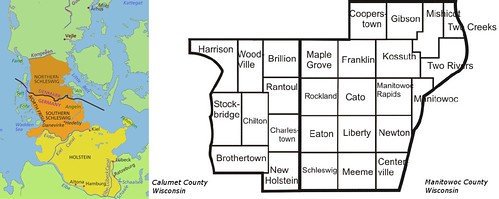When I stumbled into the Ancestry.com app nearly 2 years ago (thanks to my wife, who probably regrets showing it to me now) I knew a few things about my family tree, but it didn't go very deep.
I knew I had a lot of German blood. My mom's parents were born in Manitowoc County, Wisconsin, a part of the country thick with German immigrants in the late 1800s. The towns where these people lived even mirrored northern Germany. Just like in the homeland, the city of Kiel Wisconsin sits right on the border of New Holstein and Schleswig townships where many of my maternal ancestors were prominent citizens.
My maternal grandmother's name was Elaine Thielke and my mom's paternal grandmother was Thekla Mueller, and I knew they came from this area. I had also heard stories about how my grandma had family who spoke German at home and she called her Aunt Bertha "Tante Betty." My mother's maiden name is Buswell though, which we suspected was English somehow, but I had never heard of any Buswells going back beyond my great-grandpa Walter, who was born and raised near Kiel and married the aforementioned Thekla.
Elsewhere in Wisconsin, I knew I had paternal German and Dutch roots in Oshkosh from my Dad's mother. Her father was Dirk Loots (pronounced like "Loats") and her mother was Hedwig Iwer. I knew that Dirk himself was born in Holland, and with a name like Hedwig, Grandma Hattie had to be German too. Since my paternal grandfather died when my dad was 12 and was estranged from my grandma long before that, I never knew any of my Kidd relatives. They just weren't part of our family, and I didn't know anything about them.
So with the surface only scratched with my own knowledge, it didn't take long for Ancestry.com to blow the doors off of my family tree. After a few hours following census hints, I was overwhelmed with ancestors I had never heard of and wanting to know more about them and their stories.
I found that the Buswell (my mother's paternal) line stretches back to New England, and goes all the way back to an immigrant who came to the Massachusetts Bay Colony in the 1640's. They came to Wisconsin in the late 1800's and eventually found themselves in the German towns east of Lake Winnebago and married in to make my mother a little over half German, and the rest a big mix of nationalities from the long string of descendants of Isaac Buswell, our immigrant ancestor.
On the previously unknown Kidd side, I found that we are all similarly descended from Thomas Kidd, an Englishman who came to the Virginia Colony in the 1640's. And then that my dad's maternal grandmother, Hazel Schoonover is descended from Dutch immigrants to New Netherlands in the 1640's.
So of my 8 great grandparents, I have 3 who are descended from immigrants to 3 of the most important European settlements when America was just beginning to form nearly 400 years ago, 1 who was born in the Netherlands, and 4 who were descended from late 19th century German immigrants.
And that's me. I am made up of all that mess of American stuff, formed by many significant historic events and migrations. A mixed breed. - A true
American Mutt. I hope to use this blog to tell stories about my ancestors and the history that shaped their lives, because let's face it - all the dates and facts and citations can get old. To me that's just the supporting detail to the stories of their lives, which is what really interests me. I'll also share some of my genealogical journeys - the tools I like (and don't like), the thrill of my discoveries, and hopefully some resources and tips that will help others who may end up stumbling across some of my posts.
Wish me luck.

